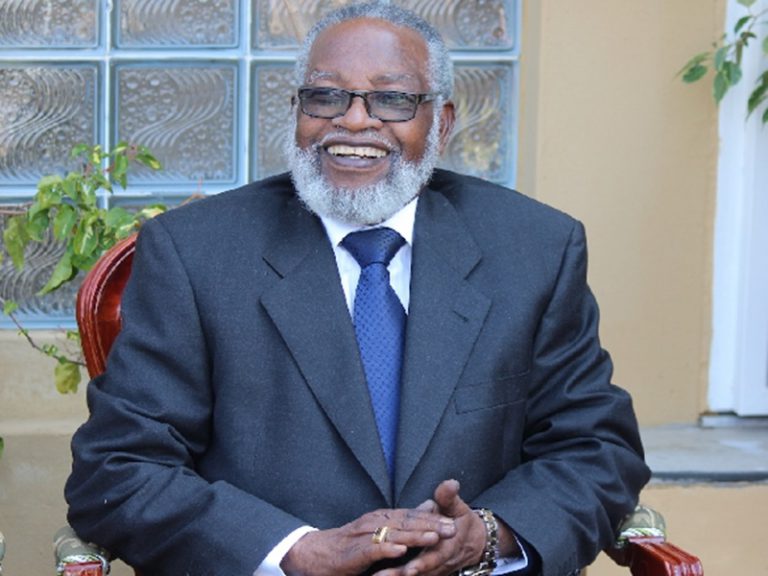
The decolonisation journey of Mzee Samuel Shafiishuna Daniel Nujoma Nujoma (1929-2025), former President of Namibia
This week Africa lost one of its Mzee who contributed to the liberation of Namibia and development of Africa. Samuel Shafiishuna Daniel Nujoma passed away on 8 February at the age of 95 years. Our condolences to wife Kovambo Mushimba, and family and the people of Namibia. Endapo nawa, Mzee.
If you are in or from Namibia and would like to write an short or long article about former President Mzee Nujoma, please reach out, maaza@africasocialwork.net



A hero’s story
He was born on May 12, 1929, in the village of Etunda near Okahao in northern Namibia, is an important figure in Namibian history. He is known for his dedication to decolonisation, making Namibia independent and becoming its first president from 1990 – 2005.
In the 1950s, Mzee helped start the Ovamboland People’s Organisation (OPO), formed in 1959 and later to become the South West Africa People’s Organisation (SWAPO).He was exiled by the White apartheid minority colonial government and was given refugee by Tanzania, under Mzee Nyerere’s protection.
In 1966, SWAPO started an armed struggle against apartheid South African, mobilising the people of Namibia to join the struggle until March 21, 1990 when political independence was obtained. His leadership during this time was crucial in moving Namibia from apartheid to democracy, guided by the principles of Ubuntu—a concept emphasising community, shared humanity, justice, and liberation.
Mzee was committed to decolonisation, the liberation of the African people, and freedom.
Timeline of Sam Nujoma’s journey
- May 12, 1929: Sam Nujoma is born in the village of Etunda near Okahao, northern Namibia.
- 1950s: Nujoma becomes politically active, advocating for the rights of Namibians.
- 1959: Co-founds the Ovamboland People’s Organisation (OPO).
- 1960: Forced into exile due to political activities; travels to various countries to gain support for Namibia’s independence.
- 1966: SWAPO (South West Africa People’s Organisation) launches an armed struggle against South African rule.
- 1970s-1980s: Nujoma continues to lead SWAPO and mobilizes international support for Namibia’s liberation.
- 1978: SWAPO fighters, including Sam Nujoma, led a significant attack against South African forces at Cassinga in Angola.
- March 21, 1990: Namibia gains independence; Sam Nujoma becomes the country’s first president.
- 1990-2005: Nujoma serves as president, working to unite the nation and rebuild it after years of conflict, guided by principles of Ubuntu, justice, and liberation.
- 2005: Nujoma steps down from the presidency after three terms.
Timeline of Namibia’s colonisation and political decolonisation
- 1486-1488: Portuguese explorers visit the Namibian coast in search of land and people to colonise.
- Late 1700s: Dutch control Walvis Bay to secure a deep-water harbour.
- 1805: British take over Walvis Bay from the Dutch.
- 1884: Germany formally annexes Namibia, naming it German South West Africa.
- 1904-1907: Herero people (who include the Himba, Tjimba, Mbanderu, and Kwandu) and Namaqua (who include the Topnaar, Naro, Bondelswarts, Fransman Nama) engaged in decolonisation from German colonial rule, leading to brutal suppression and genocide.
- 1915: During World War I, white apartheid government of South Africa send armed forces to occupy Namibia.
- 1948: Apartheid policies are implemented in Namibia by the white South African administration.
- 1966: The South West Africa People’s Organisation (SWAPO) begins an armed struggle for independence from South African rule.
- 1971: The International Court of Justice rules that South Africa’s administration of Namibia is illegal.
- 1990: Namibia gains independence on March 21.
Biography and achievements from Nujoma Foundation
Biography – https://samnujomafoundation.org/index.php/biography/
Achievements and honours of Mzee – Sam Nujoma Foundation, https://samnujomafoundation.org/index.php/achievements-accomplishments/
Use the form below to subscibe to Owia Bulletin.
Discover more from Africa Social Work & Development Network | Mtandao waKazi zaJamii naMaendeleo waAfrika
Subscribe to get the latest posts sent to your email.



You must be logged in to post a comment.